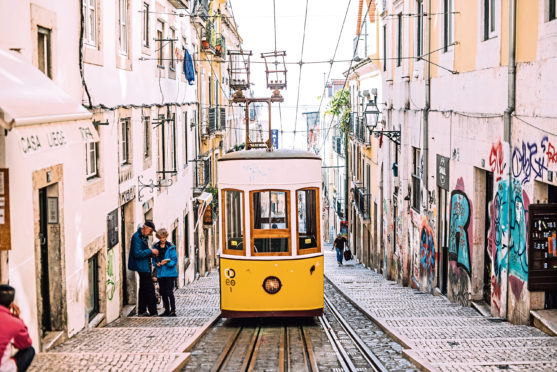
As I stand in the check-in queue at Heathrow, Michael, a BA employee who’d clearly had far more coffee than me, is excitedly moving barriers to create the most efficient queuing system.
I’ve not been on a plane for over a year, but already, the scenario feels weirdly normal.
A few days earlier, Vida Boylan, a tester for Covid travel test provider Qured, had knocked at my door to conduct the first of three coronavirus tests booked for my trip to Portugal on May 17, the momentous day international travel restrictions would be eased.
It took 24 hours to receive my negative result, which I uploaded, along with my Passenger Locator Form, as required by the Portuguese government, on to the British Airways website. My second lateral flow test would come with me to Portugal, while the third would be waiting when I got back home. Altogether, these measures added £300 to the cost of my trip.
For weeks, onlookers have been predicting the mass return of holidaymakers to green-listed beaches. However, the excited flyers I meet on Monday morning have far more “essential” reasons to travel.
Anya Edwards, 20, is one of many travellers preparing to reunite with loved ones. “I’m going to see my boyfriend – he lives out there,” she tells me. Jill Osborne, 48, is also looking forward to a reunion. “I threw caution to the wind a couple of weeks ago, hoping to meet family and friends over in Lisbon. I just prayed because the numbers were going down, Portugal might be on the green list.”
Needless to say, the atmosphere outside gate A13 is far from anxious. Despite the masks, which are mandatory throughout the airport, and the added cost of testing, everyone seems to feel the benefits of travel far outweigh any added stress caused by the new measures, or any risk they might be taking to get away.
Boarding the plane, the BA crew greet us with warm smiles and an antiseptic wipe. We wear facemasks for the duration of the flight, except during the meal service. But aside from that, the flight feels pretty normal.
Landing in Humberto Delgado Airport, it takes less than 20 minutes to get from the plane, through immigration and customs with my non-EU passport. Restrictions in Portugal include a six-person limit on gatherings indoors and outdoors. Shops and restaurants are all open, along with cinemas and theatres, though with reduced opening hours. There’s also a 10.30pm curfew on restaurants and cafés, while bars and nightlife remain closed.
Unlike the UK, Portuguese authorities require you to wear a face mask in all public places, including outside. This is relaxed a little on beaches, where you can remove your mask after setting a designated area for your group of six –although I was warned I could be fined up to 100 euros if I initially stepped on to the sand without a mask, or failed to comply with the social distancing rules.
These measures sound pretty strict, but once you get over the idea of a face-mask-shaped tan-line, Lisbon feels no stricter than London.
So, was the sand packed with British tourists? The answer is no. If I’m honest, Lisbon was ghostly quiet.
Of course, it was only day one, and I’d already been told 5,500 Brits were due to land across Portugal in the first 24 hours of UK restrictions lifting. But having spoken to my fellow travellers, I’m mildly sceptical about how many of these Brits really are “tourists”.
Visitors to Lisbon certainly won’t get the same experience today, as pre-pandemic. That said, I rather enjoyed the calm. There were no crowds, the locals were friendly, and the sun was glorious.
If anything, I rather savoured my little slice of Portuguese life, almost completely tourist-free.
Perhaps it won’t be a flood, but more a gentle trickle back to travel. But one thing’s for sure: travel definitely feels safe.
And Portugal still offers a beautiful destination for a quiet escape from the British weather.
P.S.
Portugal is one of the countries currently on the UK government’s Green List, which means that you can travel there without the need to quarantine. For more information about travel restrictions, visit gov.scot and gov.uk

Enjoy the convenience of having The Sunday Post delivered as a digital ePaper straight to your smartphone, tablet or computer.
Subscribe for only £5.49 a month and enjoy all the benefits of the printed paper as a digital replica.
Subscribe © Shutterstock
© Shutterstock